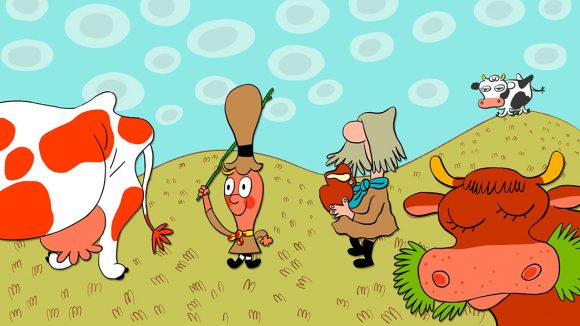The only way we understand people is by focusing on the few attributes of theirs which jut out alarmingly and tying them together. Simply put, we understand humans by stereotyping them. A person is often easy to understand because they fit a certain mould like clay does; in every single part of the crevice, completely, as a whole. When they don’t fit, words are ascribed to them: “complicated”, “unpredictable”…. the likes.
My favourite incomprehensible type is whom I call the simpleton. The modern day simpleton isn’t stupid or boorish in conceivable ways. She’s likable because of how easily she likes everyone. It’s easy to please the simpleton for she asks very little of a select few and jumps with glee when that is granted.

Have you met the dignified, intelligent stereotype? She finds the simpleton’s exuberance embarrassing and hopes that her palpable enthusiasm would fizz out. “Everyone around her has smirked at least twice. How long can she speak about a TV show? Does she not realize she just met this person a minute ago?” says the dignified, intelligent stereotype. Something about the simpleton’s enthusiasm irritates her. She’s unsure what it is, though and pegs it to the simpleton’s lack of self control. What the simpleton calls genuine, she finds undignified. “If only she could be a little more normal than she is like the rest of us?”
The simpleton on her end is fully aware and in the moment brushes aside everyone’s smirks and a few hours later spends the entire night toying with shame. The simpleton is so because she doesn’t know how else to be.
The elder male figure in her life reminds her to “calm down” and not waltz about like her amusement matters more than others perception of her. She responds by saying that it’s who she is and she doesn’t know how else to be. Her joy isn’t to amuse herself. Her joy is true.

The former however doesn’t have the heart to tell her that she’s a laughing stock but smiles at her sadly knowing well that “people like her” are prone to get bullied. He hopes she can tide through life unaware of the sniggers. But he assumes wrongly. The simpleton for all her idiocy knows that she’s laughed at. She understands people, listens to them too. People love talking to the simpleton before they go off and laugh about that one thing she did over dinner. She’s kind and hugs people when they feel like the world is working against them and promises them they will be okay.
“People are supremely good, aren’t they?” she mouths to her friend who agrees in a moment of heightened joy knowing very well that tomorrow, she wouldn’t feel as optimistically about people the way simpleton will.
The confident, optimistic guy finds the simpleton “frankly idiotic” and “a tad fake”. He thinks that this disarmingly upbeat demeanor is a facade and the simpleton is not to be trusted. He slyly tosses out a joke and hopes the simpleton fails to get it. Someone that blissfully upbeat is probably daft, he thinks.
But she gets it and rudely mumbles in response, in the moment ashamed of who she is. The simpleton is rude and blunt but understands what it is to treat someone unfairly, what it means to make someone uncomfortable. But she hasn’t been taught to fend for herself. She isn’t the fittest and invariably doesn’t survive. Thank god for the simpleton, we aren’t living as hunter gatherers.
The question then is what makes the simpleton so? The answer is difficult.
While she may cling on to certain threads of goodness, the truth is that the simpleton cannot clearly define herself. This inability of hers pushes her to be even more chatty. “ To her credit, she puts a great front.” The elder male figure remarks.
The simpleton scribbles in a notepad demanding to kill every instinct of hers when she is around people so that she doesn’t feel ashamed. A big part of the simpleton which not many people get to see is how often she feels ashamed of herself. How easy it is to feel disgusted by who she is and often for no fault of her own.
At the end of the day, none of the stereotypes told the simpleton that its okay to be that way. Not for lack of affection, but because being a simpleton isn’t very acceptable. Even if they did tell her, she wouldn’t believe them.
She tried a bunch of times to morph into another stereotype. The way she saw it, the other stereotypes were well respected, successful people who got love. The attempt to morph however didn’t work. She was unable do it. The mask felt heavy and hurt her. And so she finally told herself that one fine day, she wouldn’t go around getting misunderstood anymore. Until then, she lived the same way amidst the other stereotypes.